Hong Kong’s Rise For Democracy
BY IVAN ZHYKARIEV
Staff Writer

Hong Kong has been shaken by one of its largest ever displays of civil disobedience, as tens of thousands of people flooded the streets of one of the most prosperous cities in the world.
July, 1, 1997, Britain officially handed over Hong Kong to China, thereby ending 150 years of colonial rule.
Tough negotiations over Hong Kong’s political and social structures lead to the introduction of the Basic Law. Which meant that until 2047 Hong Kong should be ran by the principal of “one country two systems.”
It would keep its universal communist status, while people of Hong Kong would enjoy broader spectrum of rights and freedoms, unlike their mainland countrymen.
In 1997 Tony Blair, who was the prime minister of the United Kingdom at the time, told the Chinese President:
“I would very much like to see that as this chapter in our history ends, we open a new chapter for the future, one of partnership and prosperity for our countries.”
Blair stated that Britain wanted a relationship, “based on the 21st century, putting the battles and struggles of the past behind us because we want a new relationship for a new world.”
In 2003, Hong Kong residents took the streets over the security law, which proposed heavy penalties to civil and political organizations of Hong Kong, should they receive any kind of financial aid from foreign countries.
Later, in 2007 China granted Hong Kong the right to elect their leaders by 2017. Former Hong Kong mayor Donald Tsang was quoted by saying that that event marked “a timetable for obtaining universal suffrage.”
However, China had no intention to grant a full spectrum of liberties to what now became their lands. In 2014, China clarified that promise by stating that a nominating committee would choose two to three candidates, who must each be approved by 50% of the committee members.
This was the last drop of gasoline which exploded into the street protests in Hong Kong. Current Hong Kong leader Leung Chun-ying, Beijing loyalist, did not hesitate and used the force on Sunday, Oct. 5, as tear gas and batons were used in order to disperse crowds in downtown Hong Kong.
Scenes of battle were seen on the central square, while China fears wide protests all over the country, if brutal force is not used.

An article in the Chinese Communist Party’s newspaper, the People’s Daily, by the deputy director of China’s National People’s Congress Internal and Judicial Affairs Committee, Li Shenming, stated, “In today’s China, engaging in an election system of one-man-one-vote is bound to quickly lead to turmoil, unrest and even a situation of civil war.”
British Prime Minister David Cameron, voiced his concerns over the protests in the UK’s former colony.
“When we reached the agreement with China there were details of that agreement about the importance of giving the Hong Kong people a democratic future within this two systems approach that we were setting out with the Chinese so of course I am deeply concerned about what is happening and I hope this issue can be resolved,” said Cameron.
It is still unclear whether movement will go on as China is plotting a major crackdown on the protestors, as other provinces of China, are likely to follow Hong Kong’s example.



